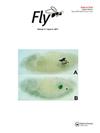What does the fruitless gene tell us about nature vs. nurture in the sex life of Drosophila?
IF 2.4
4区 生物学
Q3 BIOCHEMISTRY & MOLECULAR BIOLOGY
引用次数: 11
Abstract
ABSTRACT The fruitless (fru) gene in Drosophila has been proposed to play a master regulator role in the formation of neural circuitries for male courtship behavior, which is typically considered to be an innate behavior composed of a fixed action pattern as generated by the central pattern generator. However, recent studies have shed light on experience-dependent changes and sensory-input-guided plasticity in courtship behavior. For example, enhanced male-male courtship, a fru mutant “hallmark,” disappears when fru-mutant males are raised in isolation. The fact that neural fru expression is induced by neural activities in the adult invites the supposition that Fru as a chromatin regulator mediates experience-dependent epigenetic modification, which underlies the neural and behavioral plasticity.在果蝇的性生活中,无果基因告诉了我们什么关于先天与后天的区别?
果蝇的无果基因(fru)被认为在雄性求偶行为神经回路的形成中起着主要的调节作用,而雄性求偶行为通常被认为是一种由中央模式发生器产生的固定动作模式组成的先天行为。然而,最近的研究揭示了求偶行为的经验依赖变化和感觉输入引导的可塑性。例如,当基因突变的雄性在孤立环境中长大时,雄性之间增强的求偶行为——基因突变的“标志”——就会消失。神经fru的表达是由成人的神经活动诱导的,这一事实提出了fru作为染色质调节剂介导经验依赖的表观遗传修饰的假设,这是神经和行为可塑性的基础。
本文章由计算机程序翻译,如有差异,请以英文原文为准。
求助全文
约1分钟内获得全文
求助全文
来源期刊

Fly
生物-生化与分子生物学
CiteScore
2.90
自引率
0.00%
发文量
17
审稿时长
>12 weeks
期刊介绍:
Fly is the first international peer-reviewed journal to focus on Drosophila research. Fly covers a broad range of biological sub-disciplines, ranging from developmental biology and organogenesis to sensory neurobiology, circadian rhythm and learning and memory, to sex determination, evolutionary biology and speciation. We strive to become the “to go” resource for every researcher working with Drosophila by providing a forum where the specific interests of the Drosophila community can be discussed. With the advance of molecular technologies that enable researchers to manipulate genes and their functions in many other organisms, Fly is now also publishing papers that use other insect model systems used to investigate important biological questions.
Fly offers a variety of papers, including Original Research Articles, Methods and Technical Advances, Brief Communications, Reviews and Meeting Reports. In addition, Fly also features two unconventional types of contributions, Counterpoints and Extra View articles. Counterpoints are opinion pieces that critically discuss controversial papers questioning current paradigms, whether justified or not. Extra View articles, which generally are solicited by Fly editors, provide authors of important forthcoming papers published elsewhere an opportunity to expand on their original findings and discuss the broader impact of their discovery. Extra View authors are strongly encouraged to complement their published observations with additional data not included in the original paper or acquired subsequently.
 求助内容:
求助内容: 应助结果提醒方式:
应助结果提醒方式:


